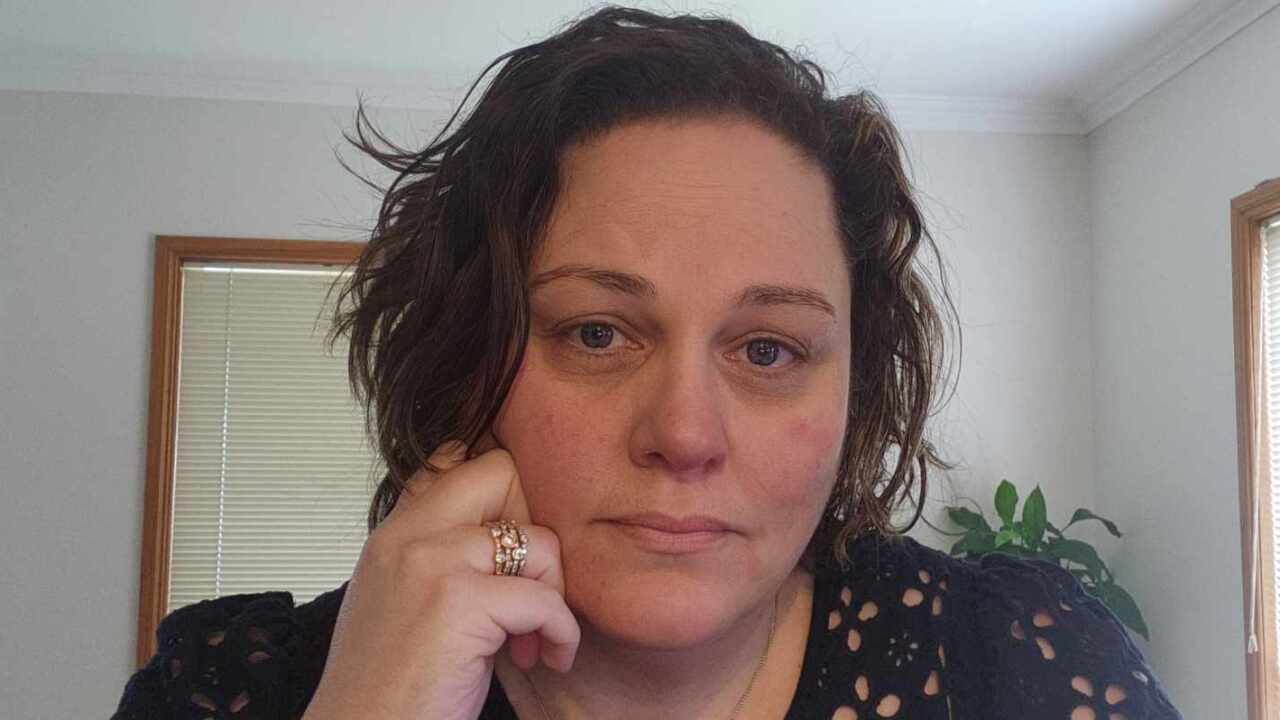Jennifer Humby has always felt like she was "meant for more, but never could do more".
As a child, her school reports described her as "talkative", "messy" and "always bringing her work in late", and observed that she "could do so much better if she applied herself".
That pattern of not quite achieving her potential, along with memory issues, not being able to sit still, and struggling to regulate her emotions, followed her into her teen and adult years, where she engaged in risky behaviours around drugs and sex, frequently changed jobs, made impulsive decisions about money, marriage and children, experienced frequent periods of burnout, and even joined a personal development "cult".
"Whenever I went to the doctor saying, 'Look, I just don't feel right', they always put it down to anxiety and depression," the 43-year-old from Mount Gambier in South Australia told SBS News.

Jennifer's school reports said she "could do so much better if she applied herself". Source: Supplied
"I was like, 'Oh my god, that's like me'," she said.
She then spent the next six months researching the neurodevelopmental disorder, before asking her GP for a referral to a psychiatrist for assessment.
Despite providing examples of how she believed her lifelong struggles were consistent with having undiagnosed ADHD, her GP refused the request and claimed, like previous doctors, that Jennifer was just anxious and depressed.
"She insisted on me getting a mental health care plan and going to see a psychologist," she said.
After a months-long wait for that appointment, the psychologist confirmed what Jennifer had suspected — but said that it would be "unethical" to formally diagnose her with ADHD as he would be unable to prescribe her any medication.
What he did do was write her a letter of support to give to her GP, which resulted in her "finally" getting the psychiatrist referral she'd asked for.
Then came the six to seven-month wait to see a psychiatrist in Adelaide — an almost five-hour drive from her home.
"It brought up a lot of anxiety because I'm like, 'What if I'm not ADHD? What if this is my solution and it's really not?' so it kind of put another layer of stress on for me, in that period."
Several weeks and thousands of dollars in appointment and travel fees later, Jennifer received a combined-type ADHD diagnosis, meaning she displayed both inattentive and hyperactivity/impulsivity symptoms.
"In that arena with the psychiatrists was the first time that I actually really felt like somebody understood it," she said.

It took stumbling upon TikTok videos about ADHD for Jennifer (pictured with her husband) to realise she might have it. Source: Supplied
Why is it so difficult to get an adult ADHD diagnosis?
An estimated one in 20 Australians have ADHD — with a significant increase in people seeking assessment in the last few years, particularly adults.
"Part of the reason that we are seeing sort of this 'explosion of diagnoses' at the moment is that a lot of people who've been struggling with mental health issues for their whole life and have been in and out of psychologists' and psychiatrists' being diagnosed with other things — but the ADHD has been missed," Luisa Livingstone, a clinical psychologist based in Melbourne, said.
Livingstone, who has ADHD herself, said that was especially the case for women and people assigned female at birth.
"The perception of ADHD when we were all children, it was very much seen as a boys' thing … it was very rare, I think, for a girl to be diagnosed," she said.
Those missed diagnoses in childhood mean "we're in a bit of a period of catch-up", Livingstone said, resulting in long waitlists in many parts of the country.
"A typical wait time for a psychiatrist can be like eight months. I've been quoted a year, 18 months, as well," she said.
"There's some places that will maybe get you in quicker, but yeah, it's pretty typical to be waiting for months and months."
The price of assessments has also "blown out a lot" in the past couple of years, Livingstone said.
While it used to cost about $450 for an initial consultation, she said some psychiatrists - particularly those at specialist ADHD clinics that largely operate on a telehealth-only basis - were charging in the thousands.
"Often that's for like one one-hour consultation with a psychiatrist, and some administrative processing around forms and all that sort of stuff," she said.
"I'd sort of question whether some of the prices out there really are appropriate for the amount of work that goes into it?"
Another area of concern is that ADHD wasn't included in the training of many of those charged with diagnosing and treating it, Dr Alison Poulton said.
"Some psychiatrists have learned and developed their skills and do a great job, but other psychiatrists still don't feel that this is part of psychiatry, or else they're doing their best and struggling without really knowing much about how to diagnose and how to treat," the Sydney-based paediatrician, who specialises in ADHD, said.
"There are psychiatrists who think that, actually, most of this (patients' symptoms) is due to trauma, or that ADHD is a diagnosis of exclusion and you can't positively diagnose someone with ADHD unless you exclude a whole lot of other things — when in fact, actually ADHD is often associated with other comorbidities."
That lack of understanding of ADHD can contribute to patients who suspect they have the condition being dismissed by medical professionals.
Some may believe that because their patient is a high achiever they "couldn't possibly have ADHD", or that in seeking a diagnosis after first learning about the symptoms through social media they're "just following a trend", Poulton said.
"I'm sure you're absolutely stigmatised when they don't know the amount of stress that you're going through on a daily basis, just to get things done that most people don't seem to have difficulty with," she said.
A further challenge is the fact current ADHD diagnostic criteria are "not fit for purpose" when it comes to assessing adults, Poulton said.
"ADHD was originally conceived as being a condition of childhood, and so the criteria were based on adults' observations of children's behaviour," she said.
"Of course, with time, it's become increasingly apparent that people don't grow out of ADHD, necessarily, when they become adults … but the criteria haven't really been developed much beyond those initial observations of children's behaviour."
Those seeking an ADHD diagnosis later in life are typically required to provide "collateral information" to show they've been experiencing symptoms since childhood, Livingstone said.
"That might be a statement from someone in your life now talking to you about, I guess, their thoughts on your ADHD symptoms and how it's affecting relationships and stuff like that," she said.
"For a lot of people, that's kind of doable — but often, as well, (medical professionals) might want to either talk to your parents and hear about what things were like when you were a child, and/or they might require that you provide school reports.
"Both of those can be problematic because sometimes people don't have their school reports, especially if it was 40 years ago, and also, sometimes people's parents might not necessarily remember what things were like, or they might not really sort of perceive that there was a problem back then."
Poulton said not being able to provide that kind of information shouldn't exclude people from being able to get an ADHD diagnosis later in life.
"We could do much better assessments of adults by asking them about how their mind works, what actually happens, what are they having most difficulty with, why are they having difficulty, what happens to their attention … this sort of thing — but that hasn't really been developed yet, so we're still stuck with this rather old-fashioned concept of ADHD that isn't very appropriate for adults," she said.
The barriers patients face when seeking timely and affordable ADHD assessment and treatment have been the subject of this year.
The committee conducting the inquiry was due to report back to the Senate last month, but was granted an extension to 6 November.
"We're hoping that the report that comes out of this will give some really good concrete recommendations which will address some of these issues," Poulton said, adding that ADHD had become a "public health crisis" in Australia.
Jennifer wants to see change made to ensure more people with ADHD can get diagnosed "without such a battle".
"The more awareness there is, the more treatment there is, the more openness to looking at it as a possibility, would actually change people's lives," she said.
Would you like to share your story with SBS News? Email [email protected]





